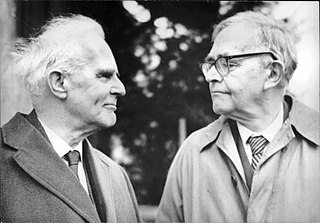A Quote by Erwin W. Lutzer
Only those who see themselves as utterly destitute can fully appreciate the grace of God.
Quote Topics
Related Quotes
God has surely promised His grace to the humbled: that is, to those who mourn over and despair of themselves. But a man cannot be thoroughly humbled till he realizes that his salvation is utterly beyond his own powers, counsels, efforts, will and works, and depends absolutely on the will, counsel, pleasure and work of Another -- God alone.
The ultimate difference between God's wisdom and man's wisdom is how they relate to the glory of God's grace in Christ crucified. God's wisdom makes the glory of God's grace our supreme treasure. But man's wisdom delights in seeing himself as resourceful, self-sufficient, self determining, and not utterly dependent on God's free grace.
The only man who has the right to say that he is justified by grace alone is the man who has left all to follow Christ. Such a man knows that the call to discipleship is a gift of grace, and that the call is inseparable from the grace. But those who try to use this grace as a dispensation from following Christ are simply deceiving themselves.
Augustine said that we were all born into the world of "common grace" [i.e., available to all]. Before one is baptized, or even if one never is, such grace meets one in God's creation. There is grace in the pear tree that blooms and blushes. There is common grace in the sea (that massive cleanliness which we are proceeding to corrupt), in the fact that there was, before we laid hands on it, clean air. Our task is to appreciate that grace.
Only at the cross of Christ does man see fully what it is that separates him from God; yet it is here alone that he perceives that he is no longer separated from God. Nowehere else does the inviolable holiness of God, the impossibility of overlooking the guilt of man stand out more plainly; but nowhere else does the limitless mercy of God, which utterly transcends all human standards, stand out more clearly and plainly.
It is grace at the beginning, and grace at the end. So that when you and I come to lie upon our death beds, the one thing that should comfort and help and strengthen us there is the thing that helped us in the beginning. Not what we have been, not what we have done, but the Grace of God in Jesus Christ our Lord. The Christian life starts with grace, it must continue with grace, it ends with grace. Grace wondrous grace. By the grace of God I am what I am. Yet not I, but the Grace of God which was with me.
Only when we see that the way of God's law is absolutely inflexible will we see that God's grace is absolutely indispensable. A high view of the law reminds us that God accepts us on the basis of Christ's perfection, not our progress. Grace, properly understood, is the movement of a holy God toward an unholy people. He doesn't cheapen the law or ease its requirements. He fulfills them in his Son, who then gives his righteousness to us. That's the gospel. Pure and simple.
Churchgoers feel righteous, responsible, and obedient to God's will. They view anyone unlike themselves as devoid of values, and therefore unworthy of God's love. By denying God to all those who have strayed from the path of righteousness, the devout are unwittingly taking on themselves a role that belongs only to God.
Those who believe they have pleased God by the quality of their devotion and moral goodness naturally feel that they and their group deserve deference and power over others. The God of Jesus and the prophets, however, saves completely by grace. He cannot be manipulated by religious and moral performance--he can only be reached through repentance, through the giving up of power. If we are saved by sheer grace we can only become grateful, willing servants of God and of everyone around us.
There are only three kinds of people. LEADERS. Those who take charge, build, inspire, and create. FOLLOWERS. Those who support leaders and work to achieve mutually beneficial goals.... [and] DESTROYERS. Destroyers cannot find it within themselves to follow anyone, their hatred and insecurity is too pure to see strength in any OTHER being. The utterly lack the ability to inspire or create, so they do the only thing left to them -- they tear down all they come in contact with.




































